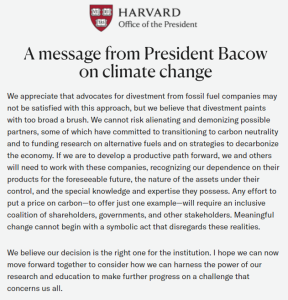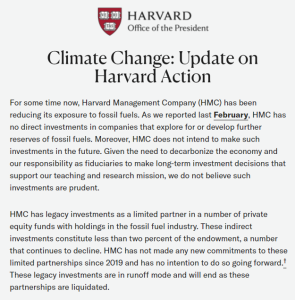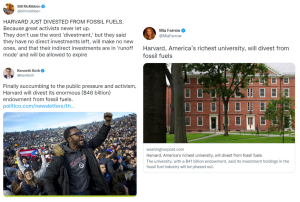Amid vocal calls for divestment, experts and financial leaders continue to affirm that engagement drives change. Endowment decision-makers and asset managers are following this plan for climate action, as their vested interests remain with the energy sector. To continue the cause of finding climate solutions, two cases in point – Harvard President Lawrence Bacow’s non-divestment climate announcement and BlackRock Chief Executive Larry Fink’s annual letter to CEOs – provide guidance how to navigate around activists’ demands
Harvard, from engagement model to communications misprint
Throughout the year, divestment announcements were more optics than actions, aimed at perceptions for prominent institutions. Too often, institutions used these opportunities to announce shifting investment strategies – thus, giving the guise of divestment against the reality of no action.
In Harvard’s case, Harvard President Bacow issued a status quo letter to the university community which included no new information regarding strategic environmental or divestment goals. It was already known that Harvard Management Company (HMC) outlined a path to decarbonize the endowment and commit a net-zero greenhouse gas status by 2050. So begs the question – why were climate activists to so quick to claim victory when President Bacow’s letter states that Harvard’s actions do not constitute divestment?



Despite headlines claiming this move as divestment, the only real action Harvard took was to dissolve some limited partnerships, with no disclosed timeline of doing so. The possibility for Harvard to retain assets in the fossil fuel industry for the next 20 to 50 years, or even longer, still remains. This mischaracterization of Harvard’s actions versus reality is significant for the overarching divestment landscape – the understanding of nuance matters if other schools or funds are considering the measure, or even following suit behind Harvard.
Top U.S. Colleges are Still Investing in Oil and Gas
While some colleges made similar moves, the majority of colleges have turned down divestment calls, maintaining investments in the oil and gas sector. Aside from Harvard University, five out of the top eight institutions with the largest endowments have not committed to divestiture of any kind and collectively allocate roughly $101.4 billion in financial assets.
Rather than divest, many Ivy League and other institutions have led efforts on helping to develop climate solutions through industry partnerships, programs and global climate goals. In particular, Princeton University has stepped up by using fossil fuel funding to commission research for reports that outline net-zero framework and by utilizing their experts to contribute to the global discussion – most recently at the United Nations’ COP26 summit – on adequate actions going forward, none of which include pure divestment.
COP26 experts agree that the industry is part of the solution
COP26 led the development of a new goal for creating a process around transparency and quantified climate financing goals by 2024. In fact, financial experts agreed that collaboration with the industry is paramount if we want to speed up climate solutions.
During the week of COP26 a climate finance-focused panel was held by the Green Finance Institute and City of London that featured Larry Fink of BlackRock and Lord Mayor of London William Russell. The conversation between these leading voices in the financial space focused on the importance engagement over divestment to affect meaningful change.
Fink, CEO of one of the world’s largest asset managers, expressed that pulling out of fossil fuel investments would be a mistake and that, in fact, hydrocarbon companies will be vital to reaching the climate solution. The BlackRock CEO iterated the importance of a fair and just energy evolution where continued support of the oil and gas industry should lead us further down the path to cleaner fuel production and solutions. His perspective came through loud and clear:
“Let us be clear, hydrocarbon companies are part of the solution, they are not the problem and the one key message I am here for is, if we are not working with the hydrocarbon companies, we will never get to net zero.” – Larry Fink, Chairman and CEO, BlackRock
Given the amount of thoughtful participation by financial institution executives, the global finance industry is more engaged than ever in actively searching and collaborating for solutions.
The year of financing and framework lies ahead
In 2022, we can expect a pivot towards the comprehensive build-out of framework for sustainability finance processes, investor behavior research and scrutiny around transparency and disclosure rules regarding climate-impacting company operations. To do so, financial experts are bringing forth relaunched expectations in favor of collaborating with the industry:
“Divesting from entire sectors – or simply passing carbon-intensive assets from public markets to private markets – will not get the world to net zero. And BlackRock does not pursue divestment from oil and gas companies as a policy.” – Larry Fink, Chairman and CEO, BlackRock
As we advance ESG investing and collaborate toward real climate and energy solutions, perhaps we can finally bid adieu to divestment – and ineffective tactic that achieved nothing in 2021.